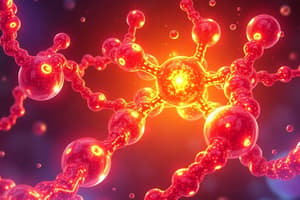Podcast
Questions and Answers
What is the primary aim of biochemistry?
What is the primary aim of biochemistry?
- To explore geological processes in Earth's crust
- To understand the molecular processes in living systems (correct)
- To develop pharmaceutical drugs exclusively
- To study the physical properties of non-living things
How does biochemistry contribute to our understanding of diseases?
How does biochemistry contribute to our understanding of diseases?
- It provides cures for all diseases
- It focuses solely on genetic disorders
- It eliminates the need for medicinal treatments
- It explains the molecular basis of why diseases occur (correct)
Which of the following aspects does biochemistry NOT focus on?
Which of the following aspects does biochemistry NOT focus on?
- Function of tissues and organs
- Structures of non-living matter (correct)
- Mechanisms within living cells
- Chemical processes in living organisms
What fundamental understanding does biochemistry provide?
What fundamental understanding does biochemistry provide?
What does biochemistry describe in molecular terms?
What does biochemistry describe in molecular terms?
Flashcards are hidden until you start studying
Study Notes
Objective of Biochemistry
- Aims for molecular-level understanding of chemical processes in living systems.
- Focuses on processes within and between living cells, essential for studying tissues, organs, and overall organism structure and function.
- Explores methods for controlling biochemical processes.
Nature of Biochemistry
- Considered the chemistry of the living cell.
- Describes molecular structures, mechanisms, functions, and chemical processes common to all living organisms.
Importance of Biochemistry
- Provides a fundamental understanding of the molecular basis of life.
- Offers insights into the molecular mechanisms underlying biological functions.
- Aids in identifying molecular malfunctions that lead to diseases.
Studying That Suits You
Use AI to generate personalized quizzes and flashcards to suit your learning preferences.




